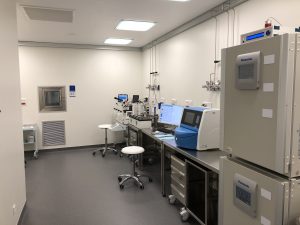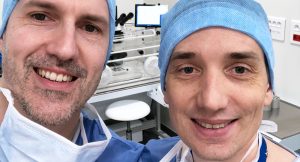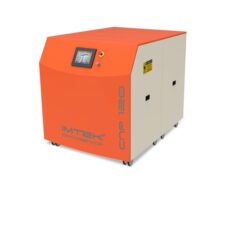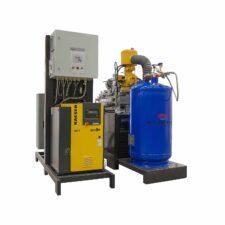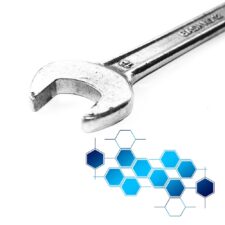Over the last few years, Asynt has made quite a name for itself as a competent partner in the field of liquid nitrogen and gas generators. Predominantly a chemistry based company, these products have opened our market up into so many varying arenas leading to the introduction of this family of products into a whole spectrum of industries. The most prominent being that of fertility and In Vitro Fertilization (IVF) sector with liquid nitrogen key to IVF.
IVF is an established technique used to create embryos from fertilisation of the egg with sperm in a clinical laboratory. The resulting embryo(s) are then transferred back into the woman’s uterus. Within the IVF clinics there are tissue banks where embryologists and andrologists freeze and store oocytes (eggs), sperm and embryos for potential parents.
Why is liquid nitrogen key to IVF processes?
The eggs, sperm and embryo are stored under liquid nitrogen to prevent degradation, thus providing those “good eggs”!
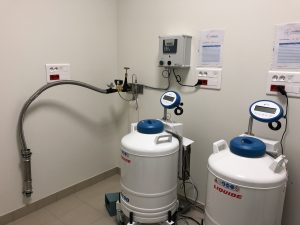
Large Dewars which are filled from a liquid nitrogen generator which is positioned on a different floor in the building.
A reliable supply of liquid nitrogen is of vital importance for semen / egg / embryo storage. Years of work and investment (not to mention incredibly personal resources) could be totally wasted should the content of a cryogenic vessel perish due to a lack of sufficient liquid nitrogen. Of course, some individuals have a small and finite quantity of irreplaceable “good” eggs/sperm/embryos available to them due to many different reasons hence, it is important to consider and organize liquid nitrogen availability in an utmost reliable way for both highly person implications as well as possible effects on research or drug development processes.
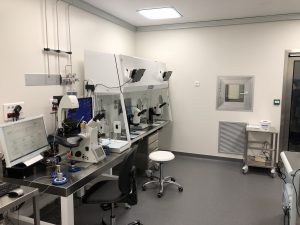
Hatch in far wall is used to pass small Dewars which are filled with liquid nitrogen through from a clean room.
All tissue in the bank is stored frozen in liquid nitrogen at a temperature of -196°C in vacuum lined tanks that are computer controlled and monitored 24 hours a day with a state of the art alarm system. Liquid nitrogen generators have their uses in a whole genre of laboratories. From Chemistry, through to Physics, Biochemistry and Clinical Medicinal labs, the availability of LN2 is exceptionally important. Whether you’re located in the middle of a city, or out in a rural location, having your own liquid nitrogen generators makes supply uncertainty a thing of the past. Couple this with the internal logistics of your facilities layout and the ease of moving dewars around the department, the ability to generate LN2 where needed is a massive plus.
Dr Xavier Pollet-Villard, MD, Embryologist and Andrologist, co-founder of the Nataliance Fertility centre, with Dr Cyril Putin, MD, installed recently a Liquid Nitrogen Generator that can generate sixty litres of LN2 every day. The liquid nitrogen produced is used to freeze and store sperm, eggs and embryos within the fertility centre located in Orléans, France. Dr Xavier Pollet-Villard said: “We treat around 600 patients per year and freeze regularly more than 5 blastocysts (Day 5 embryos) per IVF patients, which takes a lot of storage. As such, the centre uses around 8000 litres of liquid nitrogen every year, and this number will continue to grow as we shift to automatic filling of our dewars. We were the first IVF lab in France to install a LN2 generator as we estimated a return on investment over a period of time of around 5 to 6 years compared to traditional LN2 delivery.
In addition to provide flexibility in our LN2 consumption, having the ability to generate liquid nitrogen in house prevents us having to rely on external companies and potential transportation problems, as we witnessed during the last snow storm that affected our country in February. We have been using extensively our LN2 generator for 9 months now, without any issues, and we still cannot help to feel the magic of it! Moreover, LN2 is filtered and supplied to our cryoroom through a vacuum line, avoiding dirty LN2 tanks from entering our environmentally controlled embryology and cryopreservation area. Many IVF centres in France are now thinking about purchasing a LN2 generator”.
Liquid nitrogen generators are a tried and tested system worldwide. The technology has huge implications in the fields of industry, medicine and laboratory applications. Being able to eliminate the requirement for liquid nitrogen tanker deliveries which, as well as being inconvenient, drive up costs and create potential problems with evaporation and contamination aids in the smooth transition in patient care.
Find out more about our range of liquid nitrogen generators or contact us for further information!
